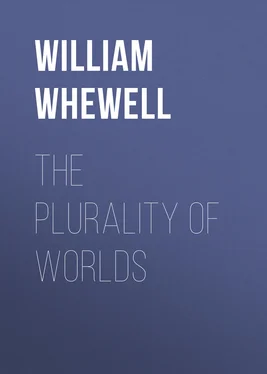William Whewell - The Plurality of Worlds
Здесь есть возможность читать онлайн «William Whewell - The Plurality of Worlds» — ознакомительный отрывок электронной книги совершенно бесплатно, а после прочтения отрывка купить полную версию. В некоторых случаях можно слушать аудио, скачать через торрент в формате fb2 и присутствует краткое содержание. Жанр: foreign_antique, Физика, foreign_edu, на английском языке. Описание произведения, (предисловие) а так же отзывы посетителей доступны на портале библиотеки ЛибКат.
- Название:The Plurality of Worlds
- Автор:
- Жанр:
- Год:неизвестен
- ISBN:нет данных
- Рейтинг книги:4 / 5. Голосов: 1
-
Избранное:Добавить в избранное
- Отзывы:
-
Ваша оценка:
- 80
- 1
- 2
- 3
- 4
- 5
The Plurality of Worlds: краткое содержание, описание и аннотация
Предлагаем к чтению аннотацию, описание, краткое содержание или предисловие (зависит от того, что написал сам автор книги «The Plurality of Worlds»). Если вы не нашли необходимую информацию о книге — напишите в комментариях, мы постараемся отыскать её.
The Plurality of Worlds — читать онлайн ознакомительный отрывок
Ниже представлен текст книги, разбитый по страницам. Система сохранения места последней прочитанной страницы, позволяет с удобством читать онлайн бесплатно книгу «The Plurality of Worlds», без необходимости каждый раз заново искать на чём Вы остановились. Поставьте закладку, и сможете в любой момент перейти на страницу, на которой закончили чтение.
Интервал:
Закладка:
9. Before I make any attempt to answer these questions, I must pursue the difficulty somewhat further, and look at it in other forms. As I have said, the history of Man has been, in certain nations, a history of intellectual progress, from the earliest times up to our own day. But intellectual progress has been, as I have also said, in a great measure confined to certain nations thus especially favored. The greater part of the earth's inhabitants have shared very scantily in that wealth of knowledge to which the brightest and happiest intellects among men have thus been led. But though the bulk of mankind have thus had little share in the grand treasures of science which are open to the race, their life has still been very different from that of other animals. Many nations, though they may not have been conspicuous in the history of intellectual progress, have yet not been without their place in progress of other kinds—in arts, in arms, and, above all, in morals—in the recognition of the distinction of right and wrong in human actions, and in the practical application of this distinction. Such a progress as this has been far more extensively aimed at, than a progress in abstract and general knowledge; and, we may venture to say, has been, in many nations and in a very great measure, really effected. No doubt the imperfection of this progress, and the constant recurrence of events which appear to counteract and reverse it, are so obvious and so common as to fill with grief and indignation the minds of those who regard such a progress as the great business of the human race; but yet still, looking at the whole history of the human race, the progress is visible; and even the grief and the indignation of which we have spoken are a part of its evidences. There has been, upon the whole, a moral government of the human race. The moral law, the distinction of right and wrong, has been established in every nation; and penalties have been established for wrong-doing. The notion of right and wrong has been extended, from mere outward acts, to the springs of action, to affection, desire, and will. The course of human affairs has generally been such, that the just, the truthful, the kind, the chaste, the orderly portion of mankind have been happier than the violent and wicked. External wrong has been commonly punished by the act of human society. Internal sins, impure and dishonest designs, falsehood, cruelty, have very often led to their own punishment, by their effect upon the guilty mind itself. We do not say that the moral government which has prevailed among men has been such, that we can consider it complete and final in its visible form. We see that the aspect of things is much the contrary; and we think we see reasons why it may be expected to be so. But still, there has existed upon earth a moral government of the human race, exercised, as we must needs hold, by the Creator of man; partly through the direct operation of man's faculties, affections, and emotions; and partly through the authorities which, in all ages and nations, the nature of man has led him to establish. Now this moral progress and moral government of the human race is one of the leading facts on which Natural Religion is founded. We are thus led to regard God as the Moral Governor of man; not only his Creator and Preserver, but his Lawgiver and his Judge. And the grounds on which we entertain this belief are peculiarly the human faculties of man, and their operation in history and in society. The belief is derived from the whole complex nature of man—the working of his Affections, Desires, Convictions, Reason, Conscience, and whatever else enters into the production of human action and its consequences. God is seen to be the Moral Governor of man by evidence which is especially derived from the character of Man, and which we could not attempt to apply to any other creature than man without making our words altogether unmeaning. But would it not be too bold an assumption to speak of the Conscience of an inhabitant of Jupiter? Would it not be a rash philosophy to assume the operation of Remorse or Self-approval on the planet, in order that we may extend to it the moral government of God? Except we can point out something more solid than this to reason from, on such subjects, there is no use in our attempting to reason at all. Our doctrines must be mere results of invention and imagination. Here then, again, we are brought to the conviction that God is, so far as we yet see, in an especial and peculiar manner, the Governor of the earth and of its human inhabitants, in such a way that the like government cannot be conceived to be extended to other planets, and other systems, without arbitrary and fanciful assumptions; assumptions either of unintelligible differences with incomprehensible results, or of beings in all respects human, inhabiting the most remote regions of the universe. And here, again, therefore, we are led to the same difficulty which we have already encountered: Can the earth, a small globe among so many millions, have been selected as the scene of this especially Divine Government?
10. That when we attempt to extend our sympathies to the inhabitants of other planets and other worlds, and to regard them as living, like us, under a moral government, we are driven to suppose them to be, in all essential respects, human beings like ourselves, we have proof, in all the attempts which have been made, with whatever license of hypothesis and fancy, to present to us descriptions and representations of the inhabitants of other parts of the universe. Such representations, though purposely made as unlike human beings as the imagination of man can frame them, still are merely combinations, slightly varied, of the elements of human being; and thus show us that not only our reason, but even our imagination, cannot conceive creatures subjected to the same government to which man is subjected, without conceiving them as being men of one kind or other. A mere animal life, with no interest but animal enjoyment, we may conceive as assuming forms different from those which appear in existing animal races; though even here, there are, as we shall hereafter attempt to show, certain general principles which run through all animal life. But when in addition to mere animal impulses, we assume or suppose moral and intellectual interests, we conceive them as the moral and intellectual interests of man. Truth and falsehood, right and wrong, law and transgression, happiness and misery, reward and punishment, are the necessary elements of all that can interest us—of all that we can call Government . To transfer these to Jupiter or to Sirius, is merely to imagine those bodies to be a sort of island of Formosa, or new Atlantis, or Utopia, or Platonic Polity, or something of the like kind. The boldest and most resolute attempts to devise some life different from human life, have not produced anything more different than romance-writers and political theorists have devised as a form of human life. And this being so, there is no more wisdom or philosophy in believing such assemblages of beings to exist in Jupiter or Sirius, without evidence, than in believing them to exist in the island of Formosa, with the like absence of evidence.
11. Any examination of what has been written on this subject would show that, in speculating about moral and intellectual beings in other regions of the universe, we merely make them to be men in another place. With regard to the plants and animals of other planets, fancy has freer play; but man cannot conceive any moral creature who is not man. Thus Fontenelle, in his Dialogues on the Plurality of Worlds , makes the inhabitants of Venus possess, in an exaggerated degree, the characteristics of the men of the warm climates of the earth. They are like the Moors of Grenada; or rather, the Moors of Grenada would be to them as cold as Greenlanders and Laplanders to us. And the inhabitants of Mercury have so much vivacity, that they would pass with us for insane. "Enfin c'est dans Mercure que sont les Petites-Maisons de l'Univers." The inhabitants of Jupiter and Saturn are immensely slow and phlegmatic. And though he and other writers attempt to make these inhabitants of remote regions in some respects superior to man, telling us that instead of only five senses, they may have six, or ten, or a hundred, still these are mere words which convey no meaning; and the great astronomer Bessel had reason to say, that those who imagined inhabitants in the Moon and Planets, supposed them, in spite of all their protestations, as like to men as one egg to another. 3 3 Populäre Vorlesungen über Wissenschaftliche Gegenstände, p. 31.
Интервал:
Закладка:
Похожие книги на «The Plurality of Worlds»
Представляем Вашему вниманию похожие книги на «The Plurality of Worlds» списком для выбора. Мы отобрали схожую по названию и смыслу литературу в надежде предоставить читателям больше вариантов отыскать новые, интересные, ещё непрочитанные произведения.
Обсуждение, отзывы о книге «The Plurality of Worlds» и просто собственные мнения читателей. Оставьте ваши комментарии, напишите, что Вы думаете о произведении, его смысле или главных героях. Укажите что конкретно понравилось, а что нет, и почему Вы так считаете.











